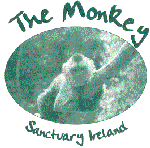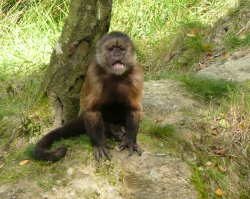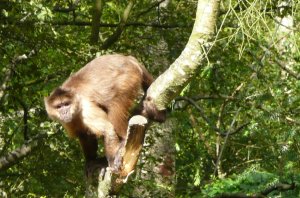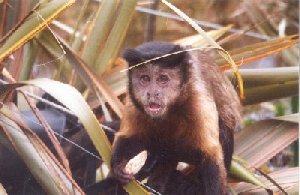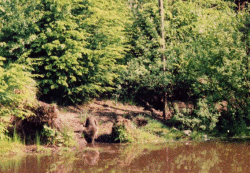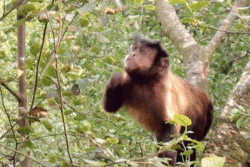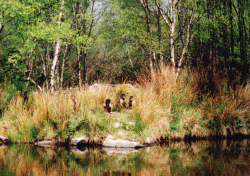|
Main Page Videos |
THE ISLAND MONKEYS
These monkeys owe their lives to what is Ireland's first and only sanctuary for unwanted primates. The best part about this unique project is how the lives of these monkeys have been totally transformed: monkeys that had spent their entire lives in cages are now are free to live on idyllic islands in a spring-fed lake at the Sanctuary, where they spend their days climbing and swinging on trees.
Willie and the gang appearing on RTE1's Nationwide in January 2010.
Many of the monkeys were born in the laboratory and spent ten years in small cages with no access to outside while they were used in experiments or for breeding. When they arrived in March 2000 the laboratory monkeys had pale, grey faces from a life confined indoors. They had never been outside, so nothing had prepared the laboratory-born monkeys for the completely new experiences awaiting them. Imagine them seeing the sky, trees, birds and other animals for the first time!
When they were released onto their islands the monkeys didn't know how to simply go down to the lake shore for a drink of water and had to be given a bucket of water to drink from. However, Mimmi, who was caught as in infant in the jungle of South America and taken to the laboratory, obviously remembered her days in the forest and was the first to drink from the lake and climb the highest up forty foot trees!!
The other monkeys learned by copying Mimmi and with time their natural instincts have re-emerged. They forage for shoots and leaves and catch insects as they do in the wild. Rehabilitating Capuchins into such naturalistic surroundings is unusual and so important for learning about their behaviour on a daily basis. Although native to South America the monkeys don't seem to mind the cooler Irish climate - they
A quartet of Capuchins, originally from a small UK, were to be put down unless a safe permanent home could be found for them. The lucky four have, since 1999, enjoyed life on their island home and explore other islands
Thanks to Tesco supermarket in Wicklow Town, SuperValu in Deansgrange and SuperValu in Roches Stores, Blackrock the monkeys have a plentiful and varied diet based on vegetables, fruit, different nuts, seeds, potatoes, cheese, cereals, bread and eggs. Good food, fresh air and plenty of space to exercise has given the monkeys thick, glossy coats, strong limbs and tanned faces.
There is a lot of work involved in running the Sanctuary and we are always very grateful for donations of money. There are many costs involved, including electricity bills (the monkeys’ heating) insurance, petrol, wood and building materials, veterinary bills, vitamin supplements and more. At the current moment we have enough voluneteers to manage the operation. To recover from their stressful past the monkeys need a very peaceful environment so we do not open to the public and therefore rely simply on donations to keep going. The Monkey Sanctuary is a registered charity run on a voluntary basis by Willie who cares for the monkeys round the clock. Our aim is that the monkeys can live out worthy, happy lives on their islands--a big commitment since Capuchin monkeys can live up to 40 years! And be joined by other monkeys in need of homes! If you would like to help The Monkey Sanctuary with money, materials or time please contact willie@monkeysanctuary.com or ring Willie on 0833581276
|
